

Onomastique et Big Data. Chaque jour, notre cerveau interprète des noms, dans une langue que nous comprenons, une culture que nous connaissons, une région que nous visitons : le menu d’un restaurant, le nom d’une entreprise… même le nom d’un animal de compagnie peut révéler quelque chose sur son propriétaire.
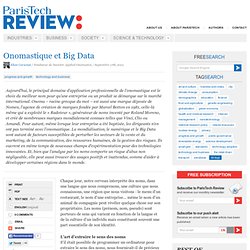
Les noms (prénom, nom, pseudo) sont porteurs de sens qui varient en fonction de la langue et de la culture d’un individu mais constituent souvent une part essentielle de son identité. L’art d’extraire le sens des noms S’il était possible de programmer un ordinateur pour extraire le sens des noms, nous fournirait-il de précieux renseignements dans le domaine des affaires ? Aux Etats-Unis, un certain nombre de personnes en sont convaincues. La CIA (Agence centrale de renseignement) a une longue expérience en la matière. En Europe, le cadre juridique permettant de tirer parti de ces outils varie d’un pays à l’autre, mais il est généralement très strict. Le logiciel qui prédit les délits. Après avoir conquis plusieurs villes américaines, "PredPol" débarque au Royaume-Uni.
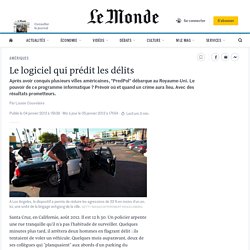
Le pouvoir de ce programme informatique ? Prévoir où et quand un crime aura lieu. Avec des résultats prometteurs. M le magazine du Monde | • Mis à jour le | Par Louise Couvelaire Santa Cruz, en Californie, août 2012. L'informateur qui leur a transmis le tuyau n'était pas un indic à l'ancienne rencontré discrètement dans une impasse... mais un logiciel d'ordinateur. Pour un peu, on se croirait propulsé dans le film de science-fiction de Steven Spielberg, Minority Report (2002), dans lequel des humains mutants prévoient les crimes à venir grâce à leur don de prescience. "Nous avons eu plus de 200 demandes, émanant de nombreux pays", assure le professeur Brantingham. L.A. Cops Embrace Crime-Predicting Algorithm. On patrol: A computer-generated “heat map,” left, shows predicted crime activity.
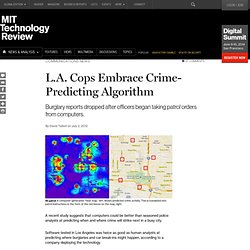
This is translated into patrol instructions in the form of the red boxes on the map, right. A recent study suggests that computers could be better than seasoned police analysts at predicting when and where crime will strike next in a busy city. Software tested in Los Angeles was twice as good as human analysts at predicting where burglaries and car break-ins might happen, according to a company deploying the technology. When police in an L.A. precinct called Foothill division followed the computer’s advice—and focused their patrols within the areas identified—those areas experienced a 25 percent drop in reported burglaries, an anomaly compared to neighboring areas. “We are seeing a tipping point—they are out there preventing the crime. The inputs are straightforward: previous crime reports, which include the time and location of a crime.
Les Echos. Can math and science help solve crimes? Scientists work with Los Angeles police to identify and analyze crime 'hotspots' UCLA's Jeffrey Brantingham works with the Los Angeles Police Department to analyze crime patterns.
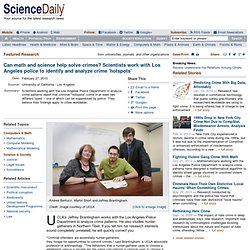
He also studies hunter-gatherers in Northern Tibet. If you tell him his research interests sound completely unrelated, he will quickly correct you. "Criminal offenders are essentially hunter-gatherers; they forage for opportunities to commit crimes," said Brantingham, a UCLA associate professor of anthropology. "The behaviors that a hunter-gatherer uses to choose a wildebeest versus a gazelle are the same calculations a criminal uses to choose a Honda versus a Lexus. " Brantingham has been working for years with Andrea Bertozzi, a professor of mathematics and director of applied mathematics at UCLA, to apply sophisticated math to urban crime patterns. They believe their findings apply not only to Los Angeles but to cities worldwide. Policing actions directed at one type of hotspot will have a very different effect from actions directed at the other type. Why Netflix Never Implemented The Algorithm That Won The Netflix $1 Million Challenge.
You probably recall all the excitement that went around when a group finally won the big Netflix $1 million prize in 2009, improving Netflix's recommendation algorithm by 10%.
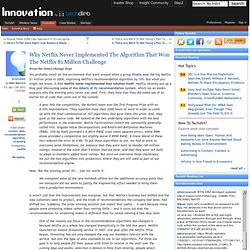
But what you might not know, is that Netflix never implemented that solution itself. Netflix recently put up a blog post discussing some of the details of its recommendation system, which (as an aside) explains why the winning entry never was used. First, they note that they did make use of an earlier bit of code that came out of the contest: A year into the competition, the Korbell team won the first Progress Prize with an 8.43% improvement. They reported more than 2000 hours of work in order to come up with the final combination of 107 algorithms that gave them this prize.
Neat. We evaluated some of the new methods offline but the additional accuracy gains that we measured did not seem to justify the engineering effort needed to bring them into a production environment.